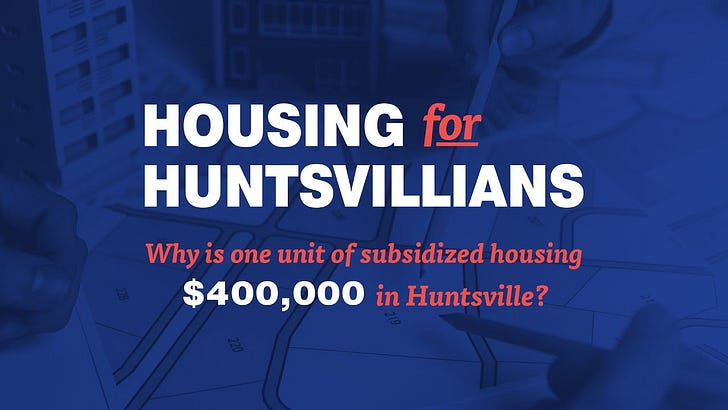In today’s episode, I summarized what I learned at a recent meeting on Mill Creek, middle-income/workforce housing, and subsidized housing in Huntsville. Learn the basics, including stats on Huntsville’s affordability problem and why it matters for everyone who cares about preventing worker shortages, promoting economic growth, and improving quality of life for residents. We also talked about how you can’t make workforce housing more affordable without legalizing dense, naturally affordable housing throughout Huntsville. A solution like enforcing building codes is a good idea, but no substitute for new housing supply. We also defined inclusionary zoning and discussed the research showing that it actually decreases overall affordability. Perhaps most interestingly, we discussed how much mixed-income, mixed use, subsidized Choice Neighborhood Initiative projects like Mill Creek cost per unit. And we interrogate the claim that it’s physically impossible to build new homes in Huntsville for less than $400,000 per unit. We would like to understand why Huntsville is trying to solve an affordability problem by building fewer, more expensive homes when what we need is more, cheaper homes.
Discussion about this post
No posts





I've thought about addressing this issue through portable condos. In 2008, I wrote to Freeman Dyson, a physicist at the Princeton Institute of Advanced Study. I basically suggested, condominiums could be mass produced and standard fitted like container homes, and then removed from buildings with giant cranes, elevators or other machinery.
This was during the housing crash of 2008, so the affordability issue was as pressing then as it was now. Robotics, and scale of manufacturing could lower the cost of the condos to something like $60,0000 for an SRO-like studio (but also 1 & 2BRs, though they would require standard fits too and cost more perhaps $80-90,000). The the issue, of course, is would anyone sign up? The cost of moving is expensive, so having a tiny home on wheels would be less overall, since there wouldn't need to be a U-Haul and movers to unload everything. Similar to Pod pickups- the box gets picked up. And I thought of all electric wiring, since gas connections would be too complicated. The homes could have their own heat pumps so that they do not need to rely as much on building utilities (except for electrical.)
I think it's normal to want/need to move cities or even neighborhoods every so often, so having a container studio in any city would be preferable and faster than dealing with leases, title transfers. The buildings themselves might still involve maintenance fees, along with property taxes, but that could be set in a way based on what other features the building has, along with neighborhood desirability- in that it would cost more to live in Manhattan, but the cost of the unit itself would be external to the rest of the infrastructure, in a way to equalize as many factors as possible.
https://github.com/hatonthecat/Post-scarcity
https://github.com/hatonthecat/Biology/blob/main/I%20wrote%20to%20Freeman%20Dyson%2015%20years%20ago%3B%20he%20responded%20nicely.pdf